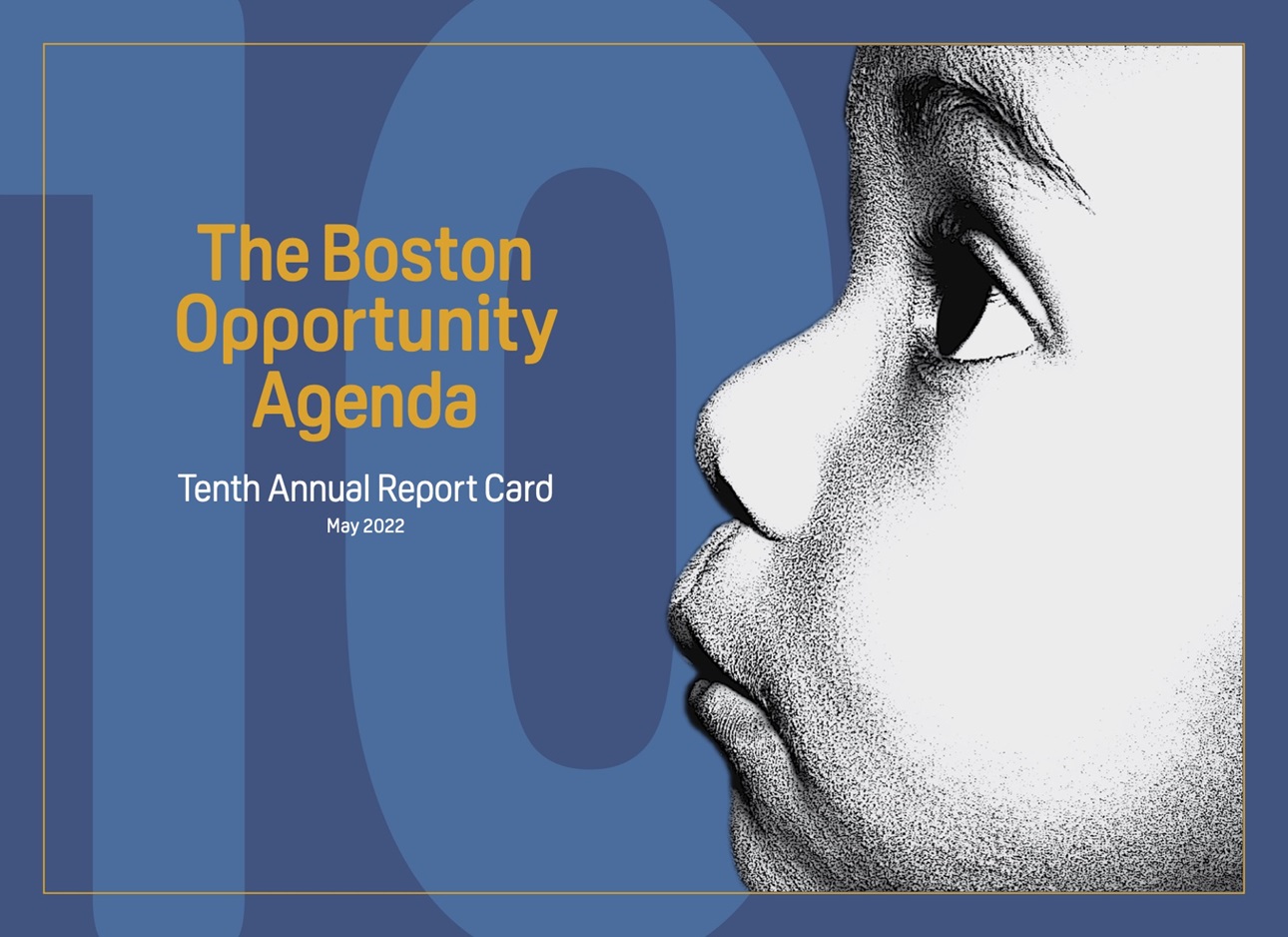Tenth Boston Opportunity Agenda Report Card shows pandemic impacts on early childhood to adult education
June 15, 2022
Boston – The 2022 edition of the Boston Opportunity Agenda Report Card finds that the COVID-19 pandemic took a significant toll on student learning over the past two years, but indicators also point to signs of student resilience. The report – the Tenth Annual Report Card from the Opportunity Agenda – tracks nine critical indicators of student success from kindergarten through higher education. It captures significant declines in student proficiency at Boston public and charter schools in Grade 3 reading and Grade 6 math, but notes other indicators were largely unaffected or even improved in the second year of the pandemic.
“We can’t overstate the amount of disruption the pandemic caused for schools, and the implications on learning and engagement,” said Antoniya Marinova, Interim Executive Director of the Boston Opportunity Agenda. “The impacts on students inside of schools and on their lives beyond the school walls were affected in countless ways. But while the data capture areas of concern, they also suggest that many students and families – particularly in early and higher education - were able to navigate the challenges to some extent.”
The disruption of the pandemic to testing and other comparative measures of student success have made evaluations more challenging in the post-pandemic era, but even with the gaps in data, the indicators for Boston’s 3rd and 6th-graders are not encouraging. The percentage of 3rd-graders reading proficiently dropped by nearly six points for Boston Public Schools students and by almost 15 percentage points for Boston Charter Schools students on the next-gen MCAS from 2018-19 to 2020-21. Students with disabilities, ELL students and those from economically disadvantaged families appear to have struggled most with the mixed remote/in-person options caused by the pandemic.
In Grade 6, the shift was even more stark, with just 19% of BPS students and 21% of Boston charter school students showing proficiency in math, down nearly 13 and 35 percentage points respectively.“The 6th grade math numbers are a worrisome sign, and a stark indicator that we need to pay special attention to reversing this trend, providing support and opportunities that can rebuild the lost time and learning,” said Marinova.
In other areas, though, the pandemic had little or no impact on success indicators. In a hopeful sign, nearly 63 percent of students entering BPS kindergarten met the MAP Reading Fluency benchmark, up more than five percentage points since 2019. And at the other end of the K-12 spectrum, both Boston Public Schools and Charter Schools had dropout rates of 2.0% or less, having cut dropouts by more than half since 2012-2013.
Both BPS and the Boston charters reported a rise in 4-year graduation for the Class of 2021 as well, up to 78.9% for BPS and 89.5% for the charters. The high overall numbers somewhat mask substantial racial and gender differences – Asian females are 25 percentage point more likely to graduate BPS in four years than Hispanic males.
And in an encouraging turnaround, the percentage of Boston graduates who met the BOA’s “readiness benchmark” – a combination of GPA, attendance, academic rigor, academic planning and out-of-school learning experiences, bounced back to 47% for the Class of 2021, after dropping to 44% for the Class of 2020. That number is roughly equal to the percentage for the baseline Class of 2017. Unlike 2020, when many students had internships and other “anytime/anywhere” learning experiences canceled by the pandemic, more than 80 percent of BPS and Boston charter Class of 2021 graduated with “anytime/anywhere learning” experiences.
“Across all dimensions of this report card, we can see the impact of COVID and the other destabilizing elements of the past two years, but we can also glimpse something else – a few signs of hope for a rebound,” said M. Lee Pelton, President and CEO of the Boston Foundation and Chair of the Boston Opportunity Agenda. “But a rebound is not nearly enough – increasing educational equity and outcomes for all students from pre-Kindergarten through adulthood is an essential precursor for closing the wealth gap and addressing racial equity.”
The full report card, which also includes data about kindergarten readiness, college completion and postsecondary credentials among adults, can be found at bostonopportunityagenda.org.

